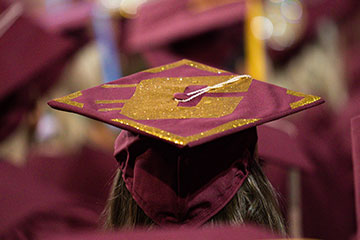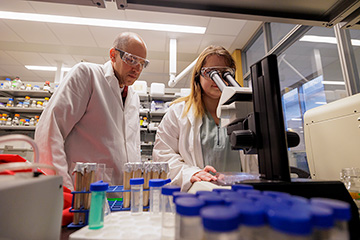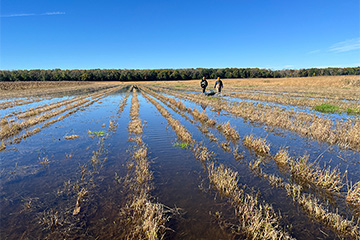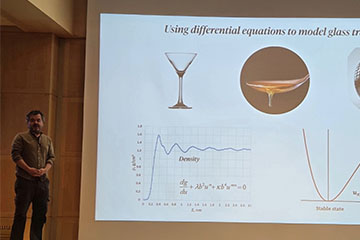International student blazes trails in fight against disease
Village’s first college graduate researches new ways to fight tuberculosis
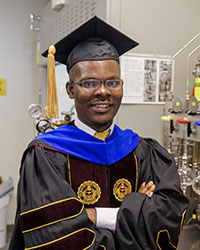
Nicholas Banahene was the first person from his village in remote Ghana to attend college, motivated by a desire to help people. He saw an opportunity to do that at Central Michigan University researching one of the world’s deadliest microorganisms.
Over the last six years, he’s researched ways to use chemistry to improve the diagnosis and treatment of tuberculosis, one of the world’s deadliest infectious diseases.
Now he’s ready to take the next step in his journey by applying what he’s learned broadly to fight diseases.
From Ghana to CMU
Banahene might have had his first run-in with the disease while growing up in a remote cocoa-farming village in Ghana. Four members of one family contracted a mysterious disease.
“They all died from a strange cough, and we had no idea what killed them,” he said.
There was also very little in the way of medical resources for either diagnosing or treating disease. Most people who got sick never knew why they were ailing and were left to either recover naturally or seek help from an herbalist. After studying TB, he suspects the bacteria that causes it – Mycobacterium tuberculosis – may have been responsible.
Banahene left his village to attend the Kwame Nkrumah University of Science and Technology in Kumasi, Ghana, the first person from his village to go to college. Inspired by the story of Alexander Fleming’s discovery of penicillin, he also sought a place he could learn how to help people.
Nearing graduation, he looked at graduate schools and a friend already at CMU recommended coming to mid-Michigan. He enrolled in CMU’s master’s in chemistry program in 2016.
Immediate attraction to the research lab
After arriving in Mt. Pleasant, Banahene wasted no time deciding to join the Swarts Lab research team.
“When I came to CMU, it caught my eye straight away,” he said. He received his master’s degree in 2018 and stayed at the lab while enrolling in the biochemistry, cellular and microbiology doctoral program.
As part of the team, Banahene helped develop chemical probes that can identify proteins used by the TB bacteria cell wall.
The potential exists for those probes to either attach a dye visible under a microscope or antibiotics to weaken the cell’s defenses. That could potentially make diagnosing TB faster and more affordable and aid in developing new antibiotics to combat drug-resistant TB.
The probes have shown enough promise in identifying TB bacteria that the dye technology is moving on to its next step.
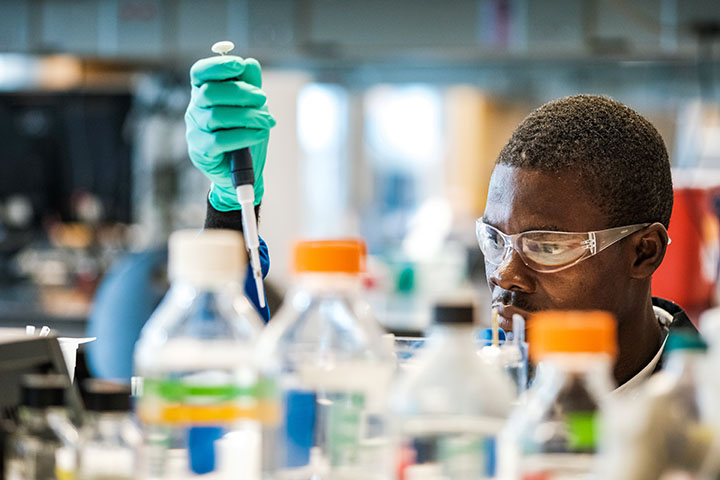
Taking the next step in his career
Banahene is also getting ready for his next step. He graduated with his doctorate in biochemistry, cellular and molecular biology in May – the first person from his village to achieve that – and has a job lined up with Eli Lilly.
There, he’ll apply skills he developed at CMU to overcome challenges in several diseases. At the Swarts lab, he grew bacteria that cause disease and made molecules to help research them. At Eli Lilly, he’ll grow human cells and human proteins that cause diseases and create strings of amino acids that have the potential to treat it.
At the Swarts lab, he also developed interpersonal skills – collaboration, research and problem-solving. Those are also critical for good science, he said.
Making a difference back home
Banahene is one of 10 children in his family, two of whom followed in his footsteps and received college degrees. One works in education and the other in building construction.
His biggest impact on people back in Ghana was inspired by something else Swarts is known for, mentoring.
Swarts received the 2023 Mid-American Conference Outstanding Faculty Award in part due to his mentorship of community college students in STEM programs across central and northern Michigan.
Banahene was inspired to do the same to people back in Ghana.
“I’m mentoring a lot of kids,” he said.
Fourteen of them, in fact. Ten in high school and four who he’s helped move on to college.
Banahene keeps in contact with them by phone or text. They share their grades, and he provides them with advice on where to go to school and what to study.
